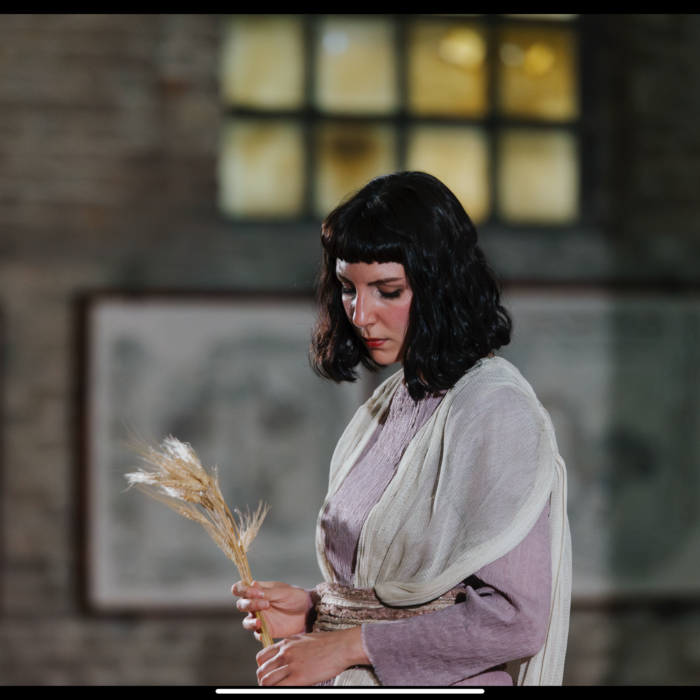
Florida Grand Opera 2024-25: Carmen
By Afton Markay(Photo credit: Lewis Valdes)
Florida Grand Opera’s 2024-25 season finale featuring Bizet’s “Carmen” served as a capstone for General Director Maria Todaro’s inaugural year with the company. Thoughtfully crafted to resonate with a diverse audience, the production honored traditional operatic sentiments while embracing contemporary themes of women’s rights and political discourse, and it celebrated the region’s diverse cultural ties. Notably, Florida Grand Opera’s “Carmen” made history by featuring all three Costa-Jackson sisters, whose viral TikTok video, “How we warm-up on our way to work,” captivated over half a million viewers. Altogether, this production stood as a testament to the exquisite artistic possibilities beginning to bloom in South Florida.
Flow and Staging
The cast and crew kindled a certain energy that was felt from downbeat to final curtain. The story and motivations of the characters were portrayed clearly. I was skeptical of FGO’s choice to stage “Carmen” without dialogue, but it worked to great effect – no context was lost and the pacing was optimal. I hope to see this style more in the future. That choice also allowed for a unique entr’acte between the Acts one and two. A quartet of a Flamenco guitarist, singers, and dancers performing a Cante Jondo Sevillano seamlessly blended into the crowd at Lillas Pastia’s as the curtain rose on Act two. The creative force of choreographer Rosa Mercedes, Todaro, and conductor Ramón Tebar produced a polished and memorable performance.
Although the production was tight and executed at a high level of operation, I was not wholly satisfied by the scenic design. There was little differentiation between Act one and two’s staging, and while Act three contrasted with a dark and gloomy vibe, it lacked a strong sense of location change from the previous sets. I felt that it could have been taking place in the city at night, but not as much in the mountains. This came as a surprise to me, as earlier this season, the company’s production of “Magic Flute” showcased an almost entirely digital set which proved to be uniquely magnificent. Incorporating some of those technological capabilities in this production could have elevated a beautiful performance into something truly remarkable.

The only time the set added to the piece as a whole was in Act four. On stage left, a fountain was discreetly blended into the set; occasionally, a sparkle of water would catch the light, drawing attention to its presence. Fully expecting the traditional ending where Carmen is stabbed, the fountain was seemingly unimportant. However, this placed the audience in Don José’s shoes and foreshadowed Carmen’s gruesome demise by drowning. Act four was thoughtfully crafted and rendered a shockingly dramatic ending.

Committed Performers
Ginger Costa-Jackson’s Carmen was intoxicating. She gracefully displayed the range of Carmen’s character. Costa-Jackson leaned into Carmen’s stereotypical sensuality and fearlessness, yet still portrayed a strong determined woman, perhaps with a touch of madness. Every note was nuanced, providing moments of comedy, passion, fear, and anger – sometimes all within a single phrase. Costa-Jackson’s “Habanera” was fiery and emphasized the expertise of her versatile instrument.
Equally impressive were her acting, and presence when she was not the center of attention. Throughout Don José’s aria, “La fleur que tu m’avais jetee,” sung by Rafael Davila, Carmen’s pointed glares communicated as powerfully as any heated lyrical passages. Davila and Costa-Jackson’s pairing made for a dynamic and tension-filled duo. Alone, Davila gave an exceptional performance of José. His intelligibility was remarkable as every word was crystal clear. His strength and stamina both vocally and physically were evident in his many long fights. These scenes were clean, believable, and engaging to watch.
Miriam Costa-Jackson gave a delightful entrance in Act one as Micaëla. She countered the deep resonance of the chorus with a delicate, fluttery tone. Also a lovely pairing was with Moralès sung by baritone Joseph Canuto‘s Leon. His robust timbre added a strong and grounded feeling to the Act one duet.
Florida Grand Opera’s Studio Artists Sydney Dardis and Mary Burke Barber in the roles of Frasquita and Mercédès, respectively, were beautifully matched not only in tone colors, but in confidence and ease in their role. Ginger Costa-Jackson’s warmth mixed with Dardis’ brightness and Barber’s vocal agility in “Mêlons! Coupons!” emphasized the breadth of soprano voices. Each repetition of “parlez, mes belles,” was jaunty and full of lilt.
Most enjoyable was the quintet, “Nous avons en tête une affaire.” Bass Andrew Payne as Il Dancaïro and tenor James Mancuso as Le Remendado, also Studio Artists, joined the leading ladies. With an extra speedy tempo, the onstage ensemble and musician in the pit performed with precision leading to a positively spectacular scene.
Orchestra and Chorus
Too often, large orchestrations and choral parts that are familiar to audiences because of their presence in the mainstream, are over-performed and unpleasantly loud. While it is fun to let go and play or sing with abandon, this does not always make for the highest level of musicality. This was not the case in this performance. Tebar’s direction was a refreshing take on Bizet’s score. I admire the restraint taken here as it produced an enjoyable listening experience.
Chorus Master Jared Peroune followed suit. The ever-popular “Votre toast, je peux vous le rendre” perfectly highlighted Alexander Birch Elliott‘s powerful baritone and the excited energy of the chorus. Another example of Peroune’s intelligent direction was in “Toutes les femmes;” bass-baritone Phillip Lopez’s Zuniga was not overtaken by the angry chorus, nor were the high voices shrill. The chorus produced a fitting amount of sharpness, but kept the musical line flowing. This scene also demonstrated the excellent fight choreography. The fights were convincing and all singers sang with healthy technique throughout.
I must also recognize Florida’s Singing Sons and Associate Director, Malcolm Rogers. The children’s chorus had great diction, a well-rounded sound, and performed in a professional manner.
Read Related Stories
-
Florida Grand Opera to Make History with ‘Carmen’ Starring the Costa-Jackson Sisters
-
Florida Grand Opera Announces 2025-26 Season
-
Florida Grand Opera 2024-25 Review: The Magic Flute


